In society, there are a lot of unspoken rules that guide how we communicate with one another. And even if we don’t always like them, there’s a shared understanding that we’re expected to follow them.
For people with autism, though, “reading the room” isn’t always straightforward. So when this Redditor joined his mother’s dinner with coworkers and was served a dish full of peas he couldn’t stand, he calmly picked them out. His mom, however, felt embarrassed watching it happen. Unsure why it caused such a reaction, he turned to the internet to ask if he was in the wrong.
Fortunately, the story takes a much more wholesome turn than anyone expected. Read it below.
The man joined his mother’s dinner with coworkers but unintentionally upset her with his eating habit

Image credits: Nadia Valko / Unsplash (not the actual photo)
Confused, he turned to the internet to ask if he was in the wrong
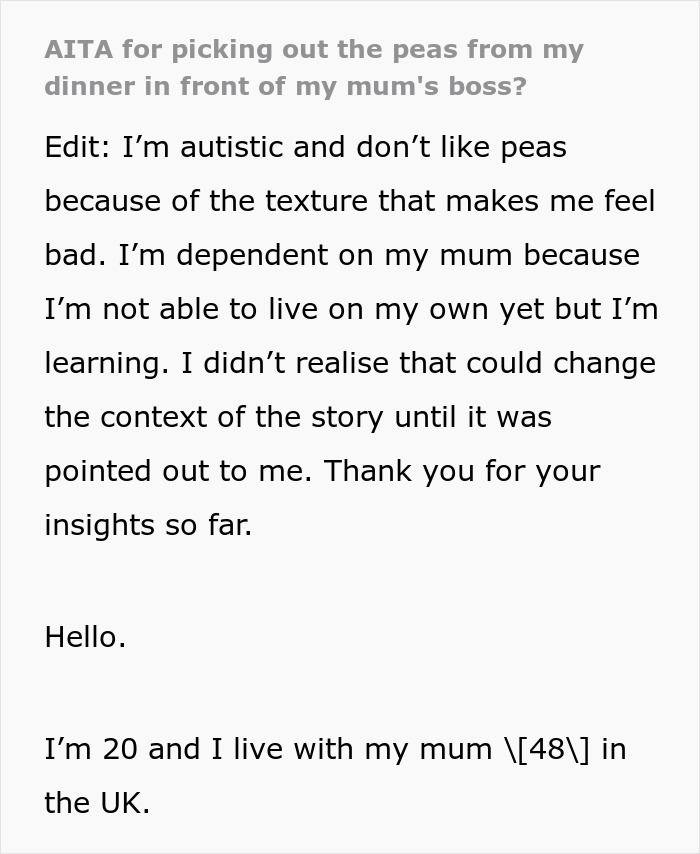



Image credits: Elena Leya / Unsplash (not the actual photo)




Image credits: nataliiakozynska / freepik (not the actual photo)





Image credits: EyeEm / freepik (not the actual photo)

Image credits: AITA-peaspicking
Many readers were supportive of the author and offered their advice
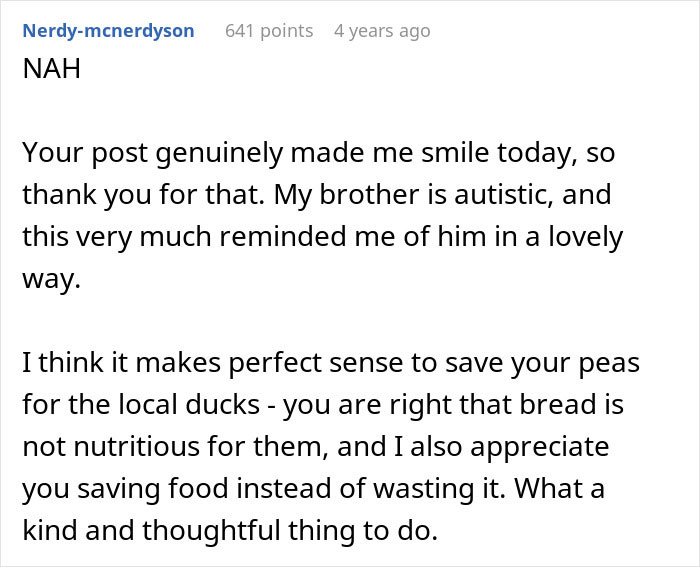

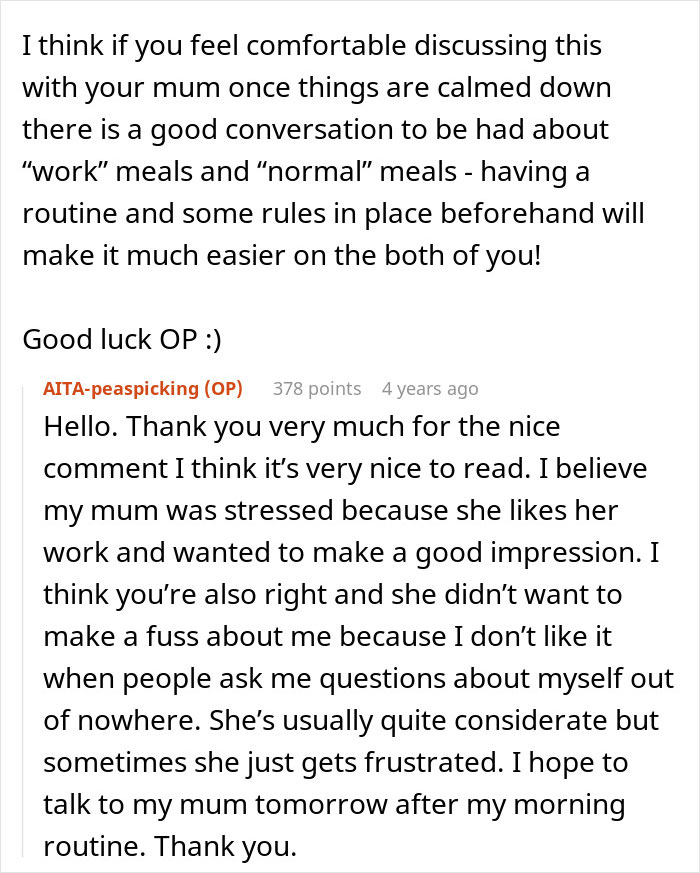

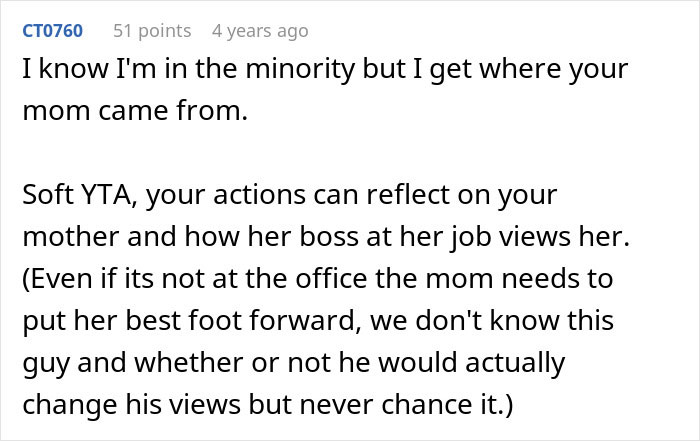

















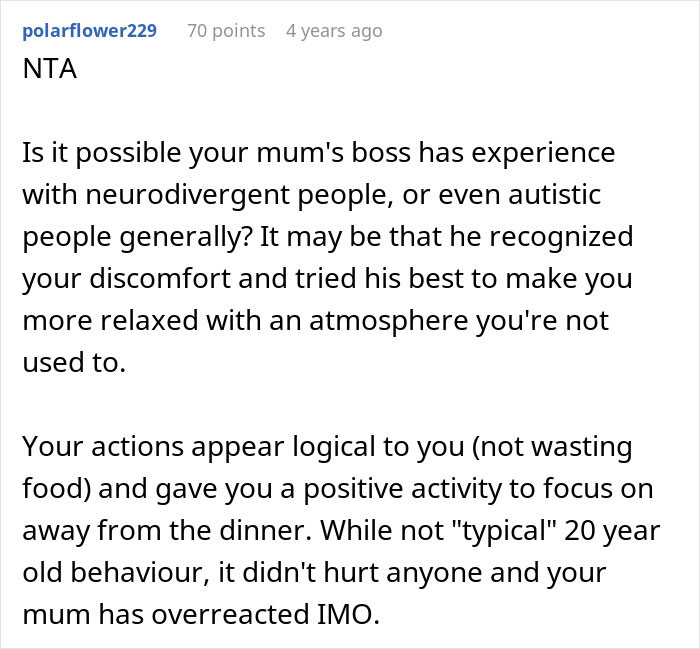










“If you’re autistic, it can feel like everyone’s fluent in a social language you were never taught”
The story is luckily such a heart-warming example of what happens when autistic people have to navigate situations full of social cues they genuinely struggle to perceive. If anything, it’s uplifting that the mother’s boss understood that better than anyone and reacted with genuine kindness. And of course, the ducks probably appreciated the gesture too.
As Sam Goldstein, PhD, explains in Psychology Today, for many autistic adults, everyday life can feel like stepping into a movie where everyone else received the script in advance while they didn’t.
“People seem to know how to move, what to say, and how to react. There are rules, cues, gestures, and tones, most of them unspoken, and yet somehow understood by everyone else,” he says. “If you’re autistic, it can feel like everyone’s fluent in a social language you were never taught.”
This has a lot to do with how the brain processes social information. Non-autistic people naturally take in things like body language, tone, facial expressions, pauses between words, and changes in someone’s voice. Their brain joins all those tiny details together automatically, so they can tell if someone is bored, annoyed, joking, or uncomfortable, even when it’s not said out loud.
For autistic people, this kind of processing isn’t automatic. They aren’t missing empathy or awareness, but their brains don’t instantly interpret those subtle signals. A raised eyebrow or a change in tone may not register as meaningful.
Instead, they often focus on the literal meaning of the words being spoken, because that’s the clearest information available. That’s why sarcasm, idioms, and indirect communication can be hard—they rely almost entirely on cues that the brain isn’t picking up in real time.

Image credits: Hiki App / Unsplash (not the actual photo)
The National Autistic Society explains that these differences can affect how someone speaks as well. Many autistic people prefer straightforward, precise language. They avoid unnecessary filler, say what they actually mean, and may pause longer to process what’s next. Some also use formal speech or fewer gestures, simply because it feels comfortable and predictable.
In social settings, though, these communication styles can be misinterpreted. For non-autistic people, direct phrasing can sound “blunt.” Longer pauses can be read as disinterest. Limited eye contact may be seen as disrespect, even though it’s often used to stay calm and focused. And a literal interpretation of someone’s words can lead to confusion if the other person was speaking metaphorically.
All of this can make autistic people seem rude when they aren’t trying to be. They’re responding with the information their brain has actually processed, while everyone else expects them to “just know” unspoken rules no one ever explained. That gap—between what one person needs spelled out and what another person assumes is obvious—is where most misunderstandings begin.
So for the author, not eating a food he dislikes felt like the simplest, most logical choice. Why eat something with a texture that feels overwhelmingly unpleasant? And to avoid wasting it, he collected the peas and planned to feed them to ducks. From his perspective, every part of that made perfect sense.
But for someone unfamiliar with how autism manifests, the same action might look disrespectful. Publicly picking apart a dish at a formal dinner can easily be interpreted as a comment on the host’s cooking or a breach of basic table manners. In environments where people try to be polite, you’re expected to either quietly leave what you don’t like or eat around it without drawing attention.
The important thing is that once everything was discussed, the man and his mother understood each other better and resolved the tension. And the warm reaction from her boss is a clear reminder of what happens when people assume good intentions and make space for different communication styles. There’s something everyone can take away from how supportive everyone chose to be.
The author later returned with an update, explaining how things went when he spoke with his mom
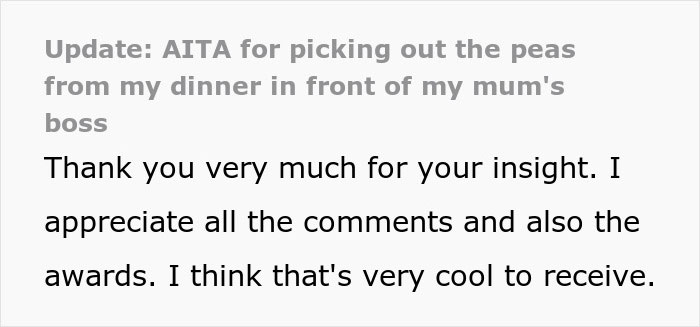
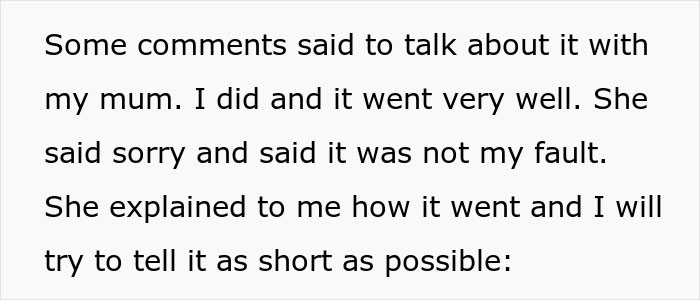
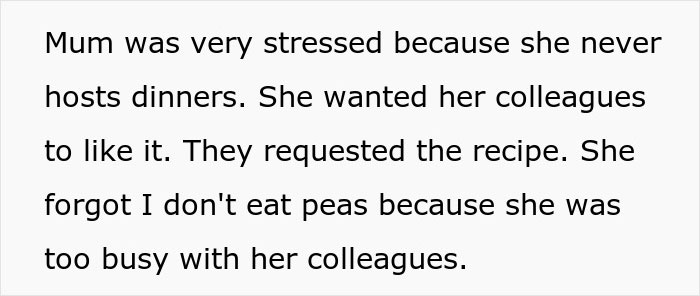



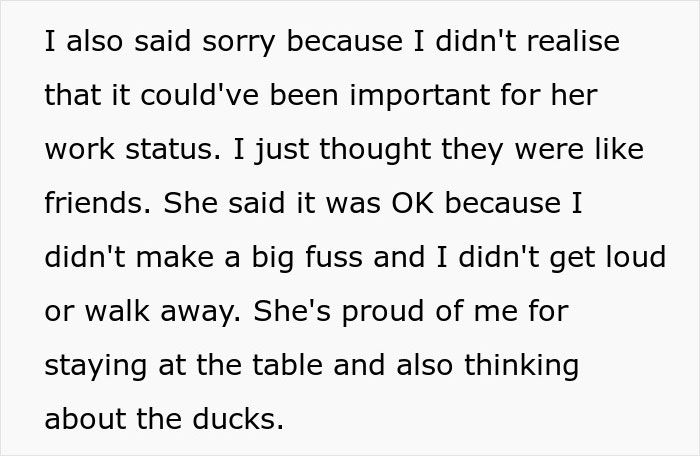



Image credits: AITA-peaspicking
The wholesome outcome won everyone over





 Follow Us
Follow Us





